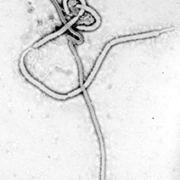The burden of sepsis around the globe: the terrible example of Ebola
Ebola, a river in the northern Democratic Republic of Congo, has become a familiar name to all of us over the last few months with the ongoing outbreak of Ebola virus disease in West Africa.
by Prof. Jean-Louis Vincent
As of September 22, 2014, this outbreak has reportedly resulted in the deaths of more than 2800 people, although with the remoteness of many of the areas affected and limited laboratory and healthcare facilities, the World Health Organization and aid agencies on site believe the actual numbers of cases affected are likely to be much higher. Although reported mortality rates associated with the current outbreak are around 48%, rates are higher in more remote areas and previous outbreaks have been associated with rates as high as 90%.
Mode of transmission
The virus is transmitted to humans from infected animals, with the vector believed to be the fruit bat, and human-to-human transmission then occurs by direct contact with body fluids (urine, vomit, blood, saliva, semen) from infected patients. Incubation periods can be as long as 21 days and active virus can remain present in some body fluids, e.g., semen, for as long as 7 weeks after recovery from Ebola virus disease. Because of the mode of transmission, healthcare workers and close family members have been the prime victims in the current outbreak. The limited medical and infection control resources in West Africa have assisted the spread of the virus. The sheer extent of the current outbreak with spread to neighboring countries and the clear threat of transfer beyond the African continent via international travel have begun to mobilize the international community. But how does this disastrous event for western Africa really affect us as physicians in the developed world? What importance does it carry for the wider medical and intensive care community?
The implications for the developed world
First, those of us in the privileged position of working in organized and (relatively) well-resourced hospitals and intensive care units (ICUs) need to help and support our colleagues in West Africa, whether that be by offering time and travelling to assist locally, being prepared to adjust home rotas to free-up colleagues who wish to help overseas, provide financial or material support, accelerate research agendas for new vaccines and therapies, or on a more global, longer-term scale take part in initiatives to help prevent such an outbreak in the future by improving medical structure and facilities worldwide.
Second, we need to encourage strategies to contain the disease and prevent spread at the borders of affected countries and at home. As physicians, we have a vital role in educating those in the front-line, e.g. airline staff and border police, in the recognition of likely symptoms and essential initial infection control practices. Ebola virus disease is not spread by air, thus reducing the risks of disease transmission, but care is still required to avoid direct contact with any body fluids and the basics of infection control, such as hand-washing cannot be stressed enough. With the ease and speed of modern travel, everyone needs to be aware of the symptoms of Ebola virus disease and be alert to the possibility that anyone who has recently travelled to an infected area and presents with suggestive symptoms could be infected. Such cases should be managed appropriately with adequate infection control until tests results are available. Suspect cases have already presented to hospitals in various countries including Austria, Belgium, Germany and Canada


